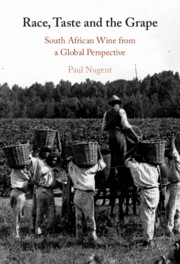Book contents
- Race, Taste and the Grape
- Race, Taste and the Grape
- Copyright page
- Dedication
- Note on the Text
- Contents
- Figures
- Tables
- Acknowledgements
- Note on Measurements
- Abbreviations
- Maps
- Introduction
- 1 Contesting the Moral High Ground
- 2 ‘South Africa Calling the World’
- 3 Orchestrating a White Wine Revolution
- 4 De-racializing the Liquor Laws
- 5 Bureaucracy without the State
- 6 Selling Wine to the Many
- 7 A Perfect Storm
- 8 The Renaissance of South African Wine
- 9 Terroirs, Brands and Competition
- Conclusion
- Bibliography
- Index
9 - Terroirs, Brands and Competition
The Emerging Landscape of South African Wine
Published online by Cambridge University Press: 16 March 2024
- Race, Taste and the Grape
- Race, Taste and the Grape
- Copyright page
- Dedication
- Note on the Text
- Contents
- Figures
- Tables
- Acknowledgements
- Note on Measurements
- Abbreviations
- Maps
- Introduction
- 1 Contesting the Moral High Ground
- 2 ‘South Africa Calling the World’
- 3 Orchestrating a White Wine Revolution
- 4 De-racializing the Liquor Laws
- 5 Bureaucracy without the State
- 6 Selling Wine to the Many
- 7 A Perfect Storm
- 8 The Renaissance of South African Wine
- 9 Terroirs, Brands and Competition
- Conclusion
- Bibliography
- Index
Summary
This chapter deals with the tension between the need for producers to stay ahead of the competition whilst finding ways of cooperating. It begins with an account of the belated appropriation of the concept of terroir, which has been assisted by the flexibility of the Wine of Origin (WO) system. The chapter compares the very different approach to terroir in the Swartland, Stellenbosch and the Hemel-en-Aarde Valley, and the quite distinct ways in which producers have sought to come together to market it. The discussion then turns to strategies to develop wine brands in a context where producers, whose farms are typically small, need to source grapes from further afield. Under the WO system, it is possible to play to the distinct terroir of where the farm is located, which is reflected in the branding, while creating second and third labels for wines made from grapes with a different origin. Hence the premium associated with quality is augmented by the volume that buying in grapes permits, thereby contributing to overall profitability. A brief discussion of black wine brands follows. The final section addresses a range of issues relating to competition and cooperation. There is a discussion of sensitivity to scoring within wine guides and wine competitions and how this influences marketing. A contrast is made between the collapse of the Cape Estate Wine Producers Association (CEWPA) and the success of cultivar-specific associations and the proliferation of wine routes.
Keywords
- Type
- Chapter
- Information
- Race, Taste and the GrapeSouth African Wine from a Global Perspective, pp. 286 - 311Publisher: Cambridge University PressPrint publication year: 2024



